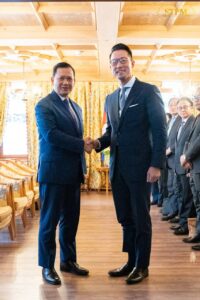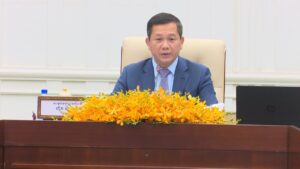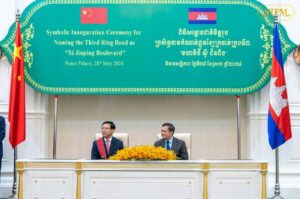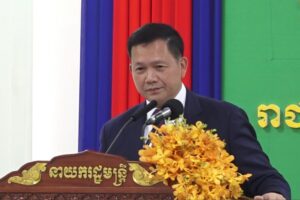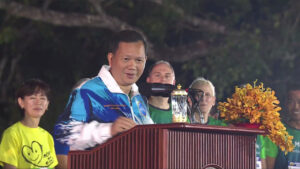Selected Comments Samdech Moha Bovor Thipadei Hun Manet, at the closing session of the 2023 stocktaking of agriculture, forestry and fisheries, and the directives setting for 2024
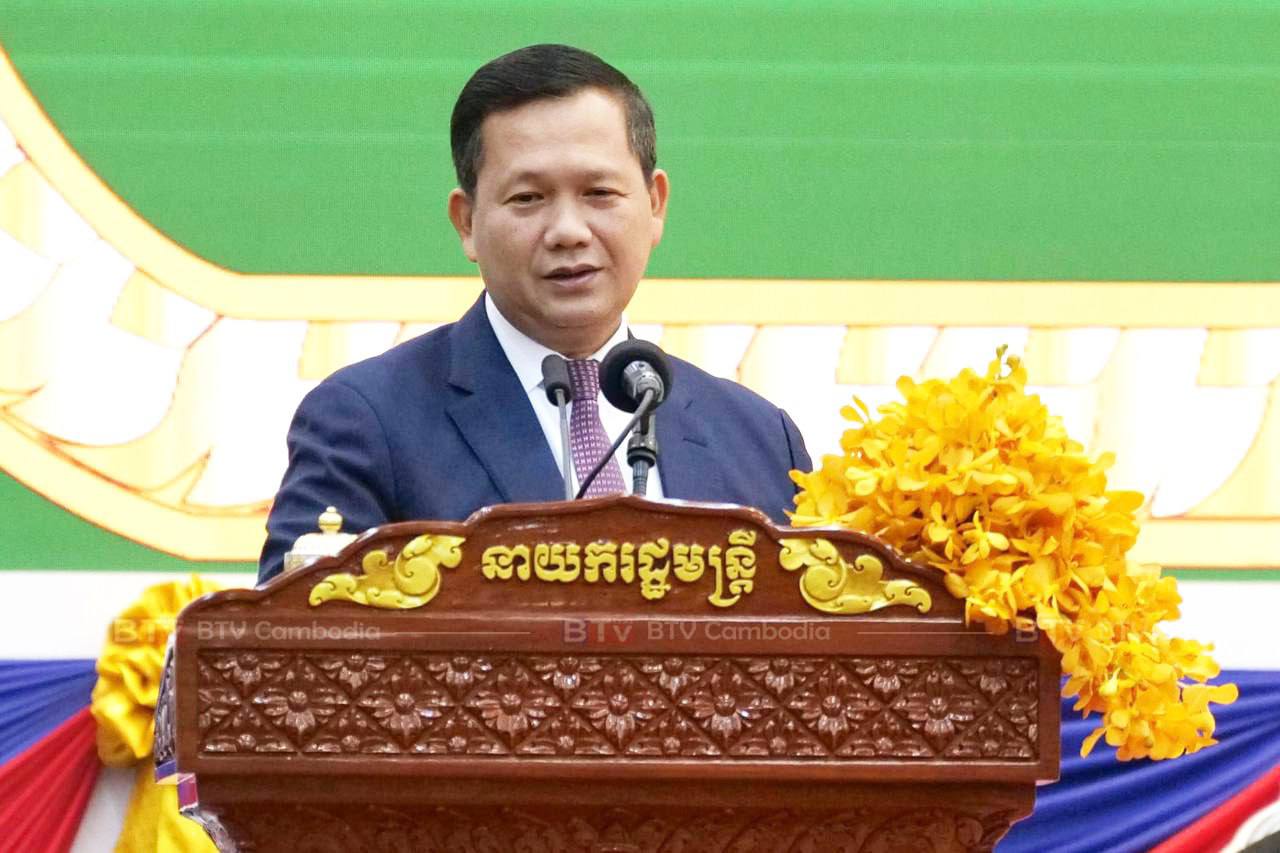 Selected Comments Samdech Moha Bovor Thipadei Hun Manet, at the closing session of the 2023 stocktaking of agriculture, forestry and fisheries, and the directives setting for 2024
Selected Comments Samdech Moha Bovor Thipadei Hun Manet, at the closing session of the 2023 stocktaking of agriculture, forestry and fisheries, and the directives setting for 2024
Selected Comments Samdech Moha Bovor Thipadei Hun Manet, at the closing session of the 2023 stocktaking of agriculture, forestry and fisheries, and the directives setting for 2024
[Unofficial Translation]
**************
[1]
(1) El Niño phenomenon can last a long time, the authorities may need to intervene, rescue and try to maintain the water reservoir
[…] The world assesses the long-term risks of El Niño (this year). Last year we had a lot of favorable both in wet and dry rice cultivation, and the price (of rice) was high as well. Due to the high price, our farmers have rushed to grow dry season rice beyond the planned (area of cultivation). This is good, but do not just see the immediate results (while neglecting the fact that we will have shortage of water for irrigation) […] some people have asked why some provinces have issued instructions not to allow people to cultivate the second round of dry season rice? The water in our reservoirs is for both rice and people. We need to guarantee in the actual plan to rescue water shortage in a timely manner with provincial administrations […]
(2) Regarding frozen meat imports, the government has to ensure farmers sell their produces at a good price and to prevent price inflation
Regarding food security, it is related to what (the Minister of Agriculture, Forestry and Fisheries,) HE Dith Tina mentioned that the import of frozen meat, for which our people have asked for intervention from the Royal Government (to block them), the Ministry of Agriculture had led a meeting with our livestock sector. Of course, the solution is the Royal Government has to guarantee two things. The first is to ensure that agricultural products are sold at a good price and our farmers will secure their incomes, and the second is to ensure that there is no price inflation. The Ministry of Commerce sent me every day the price (of various items) and any items that face the jacking up of more than 20% is considered a risk. Luckily, we have had price increase for today, but it goes back down the day after. We hope no items would go up for a month, two months or three months in a row […]
(3) Suspend import of frozen meat for a while, divert buyers to connect with local farmers
In the past, a number of policies, such as suspending the import of offal and some frozen meat, pork, chicken and some meats for six months, have been put in place, starting from March. But this intervention is not a durable measure that we want to take all the time. We want to be sustainable. We wanted to take the competitive animal husbandry. Secondly, when we temporarily suspend the import of this frozen meat items, we divert the buyer of the imported frozen piece to meet our farmers and to buy from them. Our farmers will have to learn to technically freeze it. The next day, even if there is no ban (of import), we can still create a market for internal supply systems […]
(4) To increase the competitiveness to remove the import barrier
Thus, the long-term thinking is to enable farmers to be competitive, at least to meet domestic demand if not export, or to reduce the import of many foodstuffs. We set a policy not to import meat or stuff. It also goes against the principles of the WTO. We are now a signatory to several free trade agreements. In the future, it requires us to increase our own competitiveness, because we have to remove the import barrier for them, should we want them to remove the export barrier from us […]
(5) To open trade channels is to be prepared to increase the ability to compete and take advantage from the other side
I commend the Ministry of Agriculture (Forestry and Fisheries) for its dedicated works. I see a lot of measures, concepts and methods applied to strengthen the internal practices as well as to put in place methods to ensure such sustainability and competitiveness. This is especially important for the Ministry of Commerce. Negotiating with others is for the sake of opening trade channels. To ensure that this trade channel will provide more profit, we have to make sure that we possess the ability to draw profit. Once the door is open, we have to compete – both from our side and from the other side. It provides opportunity for us to create more markets, but also a challenge for us to increase the capacity and technique and quality of our production […]
[3]
(6) preferential tax policy on household farmland reaffirmed
Let me reaffirm the preferential tax policy that the Royal Government of the 7th legislature will continue […] first, to impose no tax on household farmland, import of agricultural materials, agricultural products, agricultural production; second, to provide exemption of value added excise on basic food items until 2028; and third, to observe tax incentives for two more years until the end of 2025 for enterprises that produce locally supply goods or services that cultivate, produce or export 14 products/items – rice, corn, bean, pepper, cassava, cashew nut, rubber, Pailin longan, mango, banana, animal husbandry products, palm oil, etc. […]
[4]
(7) Ensure quality and quantity in the agricultural sector to maintain and strengthen the market
The other day at the Ministry of Commerce, I also raised this issue. Opening a new market is one thing, but it is important to maintain the existing ones and maintain the credibility of our products. The gate is open, but if there are no people (interested in buying), it is useless. Maintain and strengthen existing markets by strengthening and ensuring the quality and quantity of our supply, especially when it comes to agriculture, export standards are guaranteed […] do not forget that in the world there are nearly 200 countries, most of which export the same agricultural products. That means we have a lot of competitors. Targeting the countries to be exported, strengthening and determining the direction of the products to be exported, but to ensure the quality and reliability of the products to strengthen the existing market is a good marketing technique […]
(8) Business Strategy Working Group, open for domestic production and investment
We have set up a strategic working group (called the) Trading Board to strategically review trade relations with a number of countries, including (opening) access to agricultural products because these products are not just for exports. At present, we are not only exporting. We are trying to connect exporting and investing together. We have just signed (an agreement) with the United Arab Emirates […] we not only try to open up opportunities and strive to produce our own, we also attract companies to invest in the production here. The “Made in Cambodia” products with export standard. We will gain two things. Profits from exporting products (which bring benefits) to our farmers and profits from investing with in-coming technology […]
(9) Agriculture needs inter-institutional cooperation
Agriculture cannot do the planting or guaranteeing its intended production without the support of trade to open markets or without the support of water resources and/or rural development. Sometimes customs (also has a relevant role) to facilitate the (export/import) procedures. Therefore, this inter-institutional cooperation is the key to continue, and not only in this five-month period but for further strengthening in making the work more cohesive […] because it has a cross-sectoral character. Cross-sectoral affairs, inter-institutional affairs need to be agreed upon, as all affairs affect all aspects […]
[5]
(10) The case of flooded forest in Tonle Sap Lake, determining the geography based on the actual situation, ensuring harmony between environment and people
In the case of the flooded forest of the Tonle Sap Lake, Samdech Techo has set strict regulations to determine the geography based on the actual situation, because we must have harmony between the environment and people. The setting must ensure that both people and the environment need to be protected. What is the care for the Tonle Sap environment for? For human being. What is the care of flooded forest as a habitat for? For fish to spawn. Do we not eat fish? […] this work is not over […]
Therefore, the Royal Government of the seventh legislative term will continue to complete this work effectively and accurately in accordance with the principles set out in the sixth legislative term by Samdech Techo […] for the immediate action, we must finish the job with perfectness and efficiency through proper and systematic registration of land titles […] so as not to be difficult to check in the future […]
For step 2, after the land registration is complete, I would like to ask the Tonle Sap Authority to re-map and demarcate the frontier post and to redraw all the demarcation maps and put them into a convenient system (for the sake of monitoring) and tracking […]
In step 3, we have to make it a permanent job to maintained and manage the area well. The Tonle Sap Authority […] has to ensure the leadership, coordination and management of the Tonle Sap Lake with the relevant authorities and local administrations. Today, the provincial authorities, as well as the six provinces that are bordering with it (the Tonle Sap Lake area), are here and I am seeking their attention to implement this correctly. Our goal is integrity. Let us ensure three things – accuracy, sustainability (and) efficiency […]
[6]
(11) Agricultural officials practice their skills with warm heart to help farmers Please take care of this force (agricultural technical officers) to ensure efficiency and help our farmers, because the quantity is not guaranteed in the results. We may deploy officers but if they are incompetent and unwilling to go to work, and/or if there is a will and capability but there is not favorable condition provided for them to fulfil their missions, it is difficult to work […] I am calling on those who have become agricultural officials to go and practice their skills with their hearts to help farmers, not to just complete the work (for the required) years (and get ready to) go anywhere. They should go and fulfil their task so that during which time they complete the task, and consider that to help the farmers or to perform real merit for the farmers […]./.

